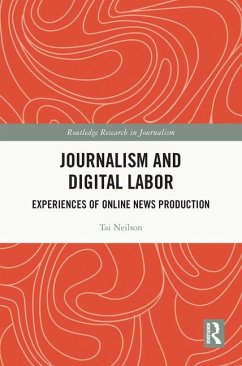
Changing Sports Journalism Practice in the Age of Digital Media
Versandkostenfrei!
Versandfertig in 6-10 Tagen
43,99 €
inkl. MwSt.
Weitere Ausgaben:

PAYBACK Punkte
22 °P sammeln!
As the funding of journalism moves centre stage as a driver in shaping the new trajectories of journalism in the digital age, this book focuses on how those working in sports journalism have had to adapt and re-invent themselves.Running through this international collection are key themes related to sports journalism in the digital environment. These include aspects of disruption to: established norms of journalistic practice; institutional allegiance; the authority and primary definer role of journalism; and the career structure and development for journalists writing about sport. The book dr...
As the funding of journalism moves centre stage as a driver in shaping the new trajectories of journalism in the digital age, this book focuses on how those working in sports journalism have had to adapt and re-invent themselves.
Running through this international collection are key themes related to sports journalism in the digital environment. These include aspects of disruption to: established norms of journalistic practice; institutional allegiance; the authority and primary definer role of journalism; and the career structure and development for journalists writing about sport. The book draws on empirically-led research that mixes qualitative and quantitative approaches and seeks to better understand and position what is going on across contemporary sports journalism. In so doing, this collection identifies change, but also areas of continuity as well as new opportunities for journalists.
This book was originally published as a special issueof Digital Journalism.
Running through this international collection are key themes related to sports journalism in the digital environment. These include aspects of disruption to: established norms of journalistic practice; institutional allegiance; the authority and primary definer role of journalism; and the career structure and development for journalists writing about sport. The book draws on empirically-led research that mixes qualitative and quantitative approaches and seeks to better understand and position what is going on across contemporary sports journalism. In so doing, this collection identifies change, but also areas of continuity as well as new opportunities for journalists.
This book was originally published as a special issueof Digital Journalism.














